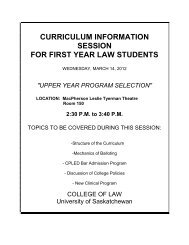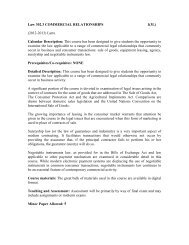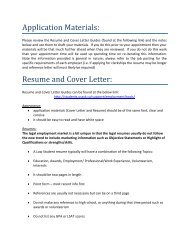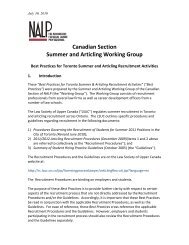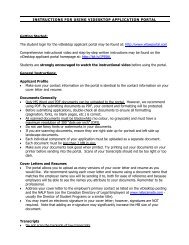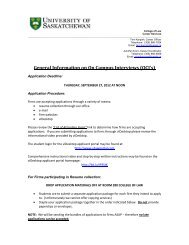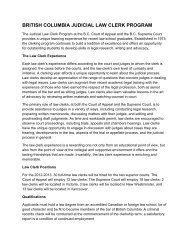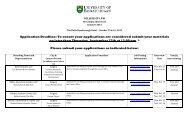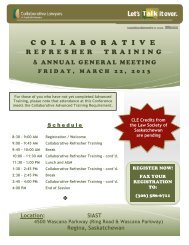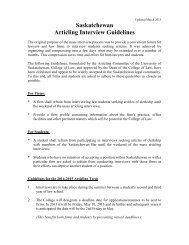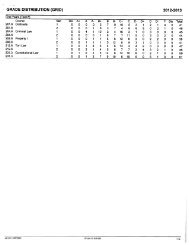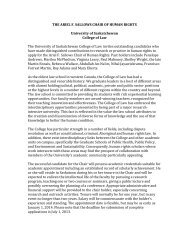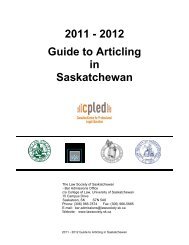2010 of NOTE - College of Law - University of Saskatchewan
2010 of NOTE - College of Law - University of Saskatchewan
2010 of NOTE - College of Law - University of Saskatchewan
Create successful ePaper yourself
Turn your PDF publications into a flip-book with our unique Google optimized e-Paper software.
John C. Kleefeld<br />
Pr<strong>of</strong>essor Kleefeld comes to the<br />
<strong>College</strong> from the <strong>University</strong> <strong>of</strong><br />
British Columbia Faculty <strong>of</strong> <strong>Law</strong>,<br />
where he was Director <strong>of</strong> the Legal<br />
Research & Writing Program. He<br />
has taught Negotiation & Dispute<br />
Resolution, Mass Torts & Class Actions,<br />
and Legal Research & Writing.<br />
He has been a Visiting Fellow<br />
at the Institute <strong>of</strong> Advanced Legal<br />
Studies in London, England, and<br />
is currently a visiting pr<strong>of</strong>essor at<br />
Libera Università Internazionale degli<br />
Studi Sociali (LUISS) Guido Carli<br />
in Rome, Italy. He began teaching<br />
at the <strong>College</strong> in January <strong>2010</strong>.<br />
Pr<strong>of</strong>essor Kleefeld completed his<br />
B.A. in Economics and worked as<br />
an economic analyst for Ontario<br />
Hydro and BC Hydro before taking<br />
up law. After earning his LL.B., he<br />
practiced for eight years with the<br />
Vancouver firms <strong>of</strong> <strong>Law</strong>son Lundell<br />
LLP and Branch MacMaster, while<br />
completing his LL.M. in Alternative<br />
Dispute Resolution. He is a member<br />
<strong>of</strong> the <strong>Law</strong> Society <strong>of</strong> British<br />
Columbia, the British Columbia<br />
Mediator Roster Society and the<br />
Alberta Arbitration & Mediation<br />
Society. He is also co-counsel in<br />
Withler v. Canada, a constitutional<br />
class action recently heard by the<br />
Supreme Court <strong>of</strong> Canada.<br />
Marilyn Poitras<br />
Pr<strong>of</strong>essor Poitras joined the faculty<br />
in 2009. Prior to the appointment<br />
her pr<strong>of</strong>essional life was a fusion <strong>of</strong><br />
law, governance, community and<br />
institutional education. Her expertise<br />
and passion is around Constitutional/Aboriginal<br />
<strong>Law</strong> with a life<br />
study <strong>of</strong> customary laws. Marilyn’s<br />
Vern Kiss John C. Kleefeld Marilyn Poitras<br />
LSA Teaching<br />
Excellence Award<br />
The <strong>Law</strong> Students’ Association<br />
Teaching Excellence Award was<br />
created in 2007 to recognize a<br />
deserving <strong>Law</strong> pr<strong>of</strong>essor who has<br />
demonstrated dedication, enthusiasm,<br />
and support to a graduating class<br />
throughout their three years in the<br />
<strong>College</strong> <strong>of</strong> <strong>Law</strong>.<br />
Pr<strong>of</strong>essor Mark Carter was the 2008<br />
recipient <strong>of</strong> this award and Pr<strong>of</strong>essor<br />
Ronald Cumming in 2009.<br />
The 2007 co-recipients were<br />
Pr<strong>of</strong>essors Heather Heavin and Glen<br />
Luther. n<br />
Mark Carter<br />
legal career began as a Native<br />
Court Worker and moved into the<br />
area <strong>of</strong> Constitutional law after her<br />
articles with the <strong>Saskatchewan</strong> Department<br />
<strong>of</strong> Justice. She has developed<br />
a number <strong>of</strong> legal education<br />
initiatives including the precursor<br />
to the Akitsiraq <strong>Law</strong> School in<br />
Nunavut, where she has also been<br />
a pr<strong>of</strong>essor, and the Indigenous<br />
People’s Resource Management<br />
Program at the <strong>University</strong> <strong>of</strong><br />
<strong>Saskatchewan</strong>. Marilyn has worked<br />
in private practice and litigated in<br />
every level <strong>of</strong> court in Canada. She<br />
has significant experience in the<br />
development <strong>of</strong> Self Government<br />
with the Beaufort Delta Agreement,<br />
Treaty Implementation with<br />
the Federation <strong>of</strong> <strong>Saskatchewan</strong><br />
Indian Nations Treaty Table Justice<br />
Portfolio as well as the revisions to<br />
the <strong>Saskatchewan</strong> Métis Election<br />
Process. Marilyn also works on<br />
CIDA funded research on Ancestral<br />
Domain and land conflict in Central<br />
Mindanao. Her four children keep<br />
her laughing, rounded, grounded<br />
and real.<br />
Ronald Cumming<br />
Understanding ProPerty:<br />
a Guide to Canada’s Property <strong>Law</strong><br />
2nd edition<br />
Understanding Property provides a succinct overview <strong>of</strong> the principles <strong>of</strong> Canada’s<br />
laws <strong>of</strong> real and personal property in the common law provinces as well as the<br />
evolving jurisprudence in Aboriginal title. This edition incorporates several<br />
additional years <strong>of</strong> study since the previous edition. New cases and statutes from<br />
across Canada highlight intervening changes in the law. Examples, language,<br />
style, and format have been updated. Chapters have been re-ordered and subjects<br />
combined and the historical development <strong>of</strong> real property, including future<br />
interests, presented to reflect the building block approach taken by the common<br />
law. The Aboriginal title section has been substantially expanded.<br />
Part I provides definitions and sources <strong>of</strong> Canadian property law. Part II addresses<br />
personal property and its attendant legal relationships such as possession, finding,<br />
gifting and bailment. Part III addresses real property, including a historical<br />
framework, common law doctrines, and conveyancing systems. Part IV addresses<br />
Aboriginal title, <strong>of</strong>fering a historical introduction, principles <strong>of</strong> the emerging case<br />
law, and comments on some future issues.<br />
The text is highly readable, provides roadmaps through the history and<br />
precedents, and is logically divided into easy-to-follow headings and subheadings.<br />
Illustrations visually highlight concepts. A detailed Table <strong>of</strong> Contents, List <strong>of</strong> Cases,<br />
Key Word Index, and Selected Bibliography provide the basis for further research.<br />
About the Authors<br />
Pr<strong>of</strong>essors Benson, Bowden and Newman teach at the <strong>University</strong> <strong>of</strong> <strong>Saskatchewan</strong>,<br />
<strong>College</strong> <strong>of</strong> <strong>Law</strong>. Pr<strong>of</strong>essor Benson teaches and writes in the areas <strong>of</strong> property and<br />
negotiation, Pr<strong>of</strong>essor Bowden in the environmental and property law fields,<br />
and Pr<strong>of</strong>essor Newman in areas <strong>of</strong> constitutional and international law.<br />
The Skills and Ethics <strong>of</strong> Negotiation <strong>of</strong>fers a rare glimpse <strong>of</strong> lawyers’ views <strong>of</strong><br />
ethical legal negotiations in Canada. In their own words, lawyers discuss<br />
negotiations take place from the time a civil dispute enters a lawyer’s <strong>of</strong>fice<br />
until it is settled or moves to trial. Conversational style and examples<br />
from day-to-day practice explore the meaning <strong>of</strong> competence and integrity<br />
in negotiations and <strong>of</strong>fer an inside look at how ethical and best practice<br />
lawyers seek to achieve the best outcome for their clients at the least cost.<br />
The quotations are from thirty-five private practice civil litigators in Regina,<br />
Saskatoon and Calgary, selected independently for a study undertaken by<br />
Marj. Benson <strong>of</strong> the <strong>College</strong> <strong>of</strong> <strong>Law</strong>, <strong>University</strong> <strong>of</strong> <strong>Saskatchewan</strong>, funded<br />
by the <strong>Law</strong> Foundation <strong>of</strong> <strong>Saskatchewan</strong>, and supervised by a Committee<br />
appointed by the <strong>Law</strong> Society <strong>of</strong> <strong>Saskatchewan</strong> consisting <strong>of</strong> Tom Molloy,<br />
O.C., Q.C., Si Halyk, Q.C. and Dean Brent Cotter., Q.C.<br />
Although the study involves only a sample <strong>of</strong> counsel, geography, and areas<br />
<strong>of</strong> practice, the themes it addresses pervade legal negotiations. As Tom<br />
Molloy notes, “Negotiations are an important aspect in the practice <strong>of</strong><br />
law and this study provide lawyers with an important tool in guiding their<br />
conduct. This is the type <strong>of</strong> information that should be available in every<br />
law firm’s library.”<br />
The book is not just for law students and lawyers. The Canadian Bar<br />
Association Alternative Dispute Resolution Task Force said, “dispute<br />
resolution has never been, and should never be, the preserve <strong>of</strong> only the<br />
legal pr<strong>of</strong>ession.” The wisdom and reflections <strong>of</strong> these practitioners <strong>of</strong>fer<br />
insights we can all use to approach the negotiations and disputes <strong>of</strong> our<br />
daily lives effectively and efficiently, with competence, integrity, and a style<br />
unique and authentic to ourselves. (287)<br />
A Settling <strong>of</strong> Accounts<br />
While defending a client charged with sexual assault, Jeff Phillips<br />
commits an error <strong>of</strong> pr<strong>of</strong>essional judgement which changes his life forever.<br />
It leads him into a world <strong>of</strong> revenge and blackmail, where he no<br />
longer is the pr<strong>of</strong>essional advocate, but a possible criminal. How could<br />
this have happened to a successful, experienced lawyer who prided himself<br />
on his ability to help clients in impossible situations? Was this just<br />
happenstance, or has he been the victim <strong>of</strong> a sinister plot executed with<br />
devilish accuracy and timing? What effect does his personal predicament<br />
have on his views on justice and the legal system?<br />
In crafting this tale <strong>of</strong> human weakness and its consequences, Doug<br />
Schmeiser takes us not only into the world <strong>of</strong> the law, the functioning <strong>of</strong><br />
the courts, and legal education, but also the practice <strong>of</strong> medicine, the<br />
ranching industry, and the dangers <strong>of</strong> environmental degradation by the<br />
oil industry. The book highlights the inescapable love <strong>of</strong> the land by those<br />
who produce food from its bounty, and the importance <strong>of</strong> living in harmony<br />
with nature.<br />
Douglas A. Schmeiser<br />
Doug Schmeiser lives in Saskatoon,<br />
and is a Pr<strong>of</strong>essor Emeritus <strong>of</strong> <strong>Law</strong> at<br />
the <strong>University</strong> <strong>of</strong> <strong>Saskatchewan</strong>. He<br />
has had a varied career as a practising<br />
lawyer, a pr<strong>of</strong>essor <strong>of</strong> criminal and constitutional<br />
law, a law reform commissioner,<br />
and a national and international<br />
consultant on legal, judicial and constitutional<br />
reform. He has written several<br />
legal texts, but this is his first venture<br />
into the world <strong>of</strong> fiction.The book draws<br />
on his rural roots, his legal experience,<br />
and his concern for the environment.<br />
Photograph <strong>of</strong> Douglas Schmeiser © Saskatoon StarPhoenix, 2008.<br />
Cover photograph, Rockies from Waiparous © D’Arcy Norman, 2007.<br />
Cover design by<br />
David Ross Tierney.<br />
barcode here<br />
A Settling <strong>of</strong><br />
Accounts<br />
The Skills and Ethics <strong>of</strong> Negotiation<br />
(<strong>College</strong> <strong>of</strong> <strong>Law</strong>, <strong>University</strong> <strong>of</strong> <strong>Saskatchewan</strong>, 2007)<br />
By Marjorie Benson<br />
The genesis <strong>of</strong> this book was a concern that students have little access to practical understandings<br />
concerning negotiation ethics. In 2005, the <strong>Law</strong> Foundation <strong>of</strong> <strong>Saskatchewan</strong> and the <strong>College</strong><br />
<strong>of</strong> <strong>Law</strong> each agreed to contribute $2500 to a study to interview thirty-five private practitioners<br />
in Saskatoon, Regina, and Calgary on ethics in legal negotiations. Terms <strong>of</strong> the study were<br />
approved by the Behavioural Research Ethics Board <strong>of</strong> the <strong>University</strong> <strong>of</strong> <strong>Saskatchewan</strong>. The <strong>Law</strong><br />
Society <strong>of</strong> Alberta, the Canadian Bar Association <strong>Saskatchewan</strong> Branch, and the <strong>Saskatchewan</strong><br />
Continuing Legal Education Society agreed to act as neutral third parties to recommend a crosssection<br />
<strong>of</strong> civil litigators to be interviewed. The study was supervised by a Committee appointed<br />
by the <strong>Law</strong> Society <strong>of</strong> <strong>Saskatchewan</strong>, including Dean Brent Cotter Q.C., Tom Molloy, O.C., Q.C.,<br />
and Si Halyk, Q,C. Interviews were conducted between December 2005 and March 2006.<br />
The lawyers involved were exceedingly helpful and generous in <strong>of</strong>fering their time and expertise on<br />
a pro bono basis, reviewing detailed transcripts, and giving permission for publication. The <strong>Law</strong><br />
Foundation <strong>of</strong> <strong>Saskatchewan</strong> advanced funds to publish the study. Interviews were conducted<br />
on the basis <strong>of</strong> anonymity, but many practitioners later chose to waive their anonymity, and are<br />
self-identified in the book.<br />
The Skills and Ethics <strong>of</strong> Negotiation <strong>of</strong>fers a rare glimpse <strong>of</strong> lawyers’ views <strong>of</strong> ethical negotiations.<br />
In their own words, experienced practitioners discuss negotiations that take place throughout the<br />
process <strong>of</strong> negotiation and in a variety <strong>of</strong> contexts. Examples from day-to-day practice explore the<br />
meaning <strong>of</strong> competence and integrity in negotiations and <strong>of</strong>fer an inside look at how ethical and<br />
‘best practice’ lawyers seek to achieve the best outcome for their clients at the least cost.<br />
The study addresses only a sample <strong>of</strong> themes that pervade legal negotiations. As Tom Molloy<br />
notes, “Negotiations are an important aspect in the practice <strong>of</strong> law and this study provide lawyers<br />
with an important tool in guiding their conduct. This is the type <strong>of</strong> information that should be available<br />
in every law firm’s library.”<br />
Copies <strong>of</strong> The Skills and Ethics <strong>of</strong> Negotiation are available from the <strong>College</strong> <strong>of</strong> <strong>Law</strong> at a cost <strong>of</strong><br />
$45 plus shipping.<br />
Second Edition <strong>of</strong> Popular Property Book - Understanding Property:<br />
A Guide to Canada’s Property <strong>Law</strong> - 2009<br />
By Marjorie Benson, Marie Ann Bowden and Dwight Newman.<br />
As a result <strong>of</strong> continuing national demand, Carswell Thomson requested Pr<strong>of</strong>essors Benson<br />
and Bowden to undertake a second edition <strong>of</strong> Understanding Property: A Guide to Canada’s<br />
Property <strong>Law</strong>, first published in 1997. Pr<strong>of</strong>essors Benson and Bowden invited Pr<strong>of</strong>essor Newman<br />
to join the team with respect to Aboriginal title, and the result is the 2nd edition <strong>of</strong> Understanding<br />
Property.<br />
The second edition maintains the approach that made the first edition popular: an attempt to<br />
simplify and synthesize the concepts introduced in first year, real and personal property and<br />
Aboriginal title, to distill foundational understandings with fidelity to history, doctrine, and principle,<br />
and to present them in accessible language. New cases and statutes from across Canada are<br />
included to highlight intervening changes in the law. The historical development <strong>of</strong> real property,<br />
including future interests, has been expanded to reflect the building block approach taken by<br />
the common law. The Aboriginal title section has been substantially expanded to reflect developments<br />
in the past decade. Clarity and cohesiveness are the goals in providing a guide through the<br />
history and case law, conceptual structures that relate fundamental principles to one another, and<br />
a framework within which to develop detailed research strategies on specific issues related to the<br />
<strong>Law</strong> <strong>of</strong> Property.<br />
Benson, Bowden, and Newman, Understanding Property: A Guide to Canada’s Property <strong>Law</strong>,<br />
2nd ed. is currently in press and expected to be available shortly from Carswell Thomson, Toronto.<br />
A Legal Guide to Aboriginal Drinking Water -<br />
A Prairie Province Perspective<br />
By Linda F. Duncan and Marie Ann Bowden<br />
The purpose <strong>of</strong> the Guide is to support aboriginal community participation in their pursuit <strong>of</strong> safe<br />
drinking water protection laws. It covers laws related to both First Nation and Metis peoples. While<br />
the Guide focuses on the Prairie provinces, much <strong>of</strong> the information may be equally applicable to<br />
other parts <strong>of</strong> the country.<br />
The Guide was funded by the Alberta <strong>Law</strong> Foundation, the Walter and Duncan Gordon Foundation,<br />
and the Tomorrow Foundation. For further information contact Marie Ann Bowden at the<br />
<strong>College</strong> <strong>of</strong> <strong>Law</strong>, <strong>University</strong> <strong>of</strong> <strong>Saskatchewan</strong>.<br />
26 <strong>2010</strong> <strong>of</strong>Note www.usask.ca/law <strong>University</strong> <strong>of</strong> <strong>Saskatchewan</strong> <strong>College</strong> <strong>of</strong> <strong>Law</strong> Alumni Magazine www.usask.ca/law <strong>of</strong> <strong>College</strong> <strong>of</strong> <strong>Law</strong> Alumni Magazine<br />
Note <strong>2010</strong> 27<br />
Understanding ProPerty: A Guide to Canada’s Property <strong>Law</strong> 2nd edition Benson | Bowden | newman<br />
Faculty <strong>of</strong> <strong>Law</strong><br />
Publications<br />
Published by<br />
<strong>College</strong> <strong>of</strong> <strong>Law</strong>,<br />
<strong>University</strong> <strong>of</strong> <strong>Saskatchewan</strong><br />
“…information that should be available<br />
in every law firm’s library” Tom Molloy<br />
Cover and Interior Design<br />
by Articulate Eye Design<br />
The Skills and Ethics <strong>of</strong> Negotiation<br />
Benson<br />
A Settling <strong>of</strong> Accounts Douglas A. Schmeiser<br />
The Skills and Ethics<br />
<strong>of</strong> Negotiation<br />
Marjorie L. Benson<br />
<strong>College</strong> <strong>of</strong> law<br />
<strong>University</strong> <strong>of</strong> saskatChewan<br />
Douglas A. Schmeiser



